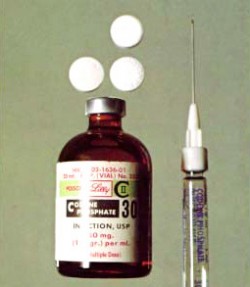What to Do If You Are Addicted to Codeine
If you think you may be addicted to codeine, you have lot of options available for help. Codeine is an opiate drug that, in high doses, can elicit the same effects as heroin and prolonging the addiction often leads to higher levels of abuse and serious health consequences that, in time, become more difficult to overcome.
Are You Addicted to Codeine?
Codeine is prescribed for treatment of mild to moderate pain and coughs. All opiate drugs convert back to morphine when they are metabolized although, codeine is considered less potent than many of them such as oxycodone or hydrocodone. In fact, in equal dosage comparisons, codeine is 1/10th as strong as morphine, but, for the simple reason that it is an opiate, it is able to alter brain circuits that regulate rewards, motivations, memory, and inhibitions that impair the user’s ability to function, normally, without it.
Not every codeine user develops an addiction, however, and there is a difference between dependence and addiction characteristics. Many legitimate users of codeine will suffer withdrawals when they quit using the codeine and this is a physical dependence that develops automatically with repeat use. When the user compulsively uses codeine despite adverse effects and consequences, they cross over the borders to addiction.
Signs of Codeine Addiction

Misusing Codeine can quickly lead to addiction.
Abuse of codeine in higher dosages or more frequently than prescribed is a preemptive sign of addiction and some individuals increase their chances of codeine addiction through alternative methods of ingestion such as snorting or IV use to feel an immediate and intense high. According to the Substance Abuse and Mental Health Services Administration, “A faster route of drug administration (e.g., injection, smoking), a shorter half‐life, and a faster onset of action all are associated with a higher abuse potential of a drug.“
Other signs you may be addicted to codeine include:
- Obsessions and uncontrollable use of codeine, intense cravings, and preoccupations with obtaining more.
- Tolerance and dependence – You take more of the medication to achieve the desired effects and use codeine to feel normal or to avoid the impending withdrawals that ceasing use will cause.
- Withdrawals – Physical and psychological withdrawals are marked with intense cravings, nausea, vomiting, diarrhea, muscle aches, body pains, anxiety, restlessness, agitation, insomnia, fever, chills, runny nose, and elevated respiration, heart rate, and blood pressure.
- Failed attempts to cease use
- Continued use despite health, social, legal, domestic, employment, financial, or other problems.
- Compulsive use despite problematic behaviors such as lying, stealing, or fraudulently obtaining codeine, avoidance, isolation, or having a negative impact on others, work, school, and social obligations.
Taking the First Step
You may have already tried to quit using codeine on your own and found that the withdrawals from the drug left you unable to function for a few days only to remain desperate for more codeine long afterwards. According to the National Institute for Health and Care Excellence (UK), “People who are opioid dependent and considering self-detoxification should be encouraged to seek detoxification in a structured treatment program or, at a minimum, to maintain contact with a drug service.”
Detox
Opiate detox methods are available to make sure that you are able to get through the process safely and with the most comfort and support. They are, however, only the beginning for your recovery.
Remaining abstinent from codeine for a few weeks is usually not enough to keep you from relapsing down the line. Codeine is much easier to get than many other opiates and without prevention tools and strategies, your temptations to use can be “triggered” in a moment’s notice and each time you relapse can cause a dependency much greater than the last.
Codeine Addiction Treatment Options
If you are addicted to codeine, you are probably hesitant in making the changes necessary to improve your life. While no addiction ends up in the same results for everyone, treatment options, also, are widely diverse. You have the options of participating in an outpatient, inpatient, residential, holistic, faith based, or alternative program that is best suited to your needs.
Because codeine is an opiate drug, you also have the options of participating in an Opioid Treatment Program (OTP) using methadone or buprenorphine to detox or for long term maintenance. According to the National Institute on Drug Abuse, “Medications developed to treat opioid addiction work through the same opioid receptors as the addictive drug, but are safer and less likely to produce the harmful behaviors that characterize addiction.”
Finding Treatment for Codeine Addiction
Exploring what’s available can give you the motivations you need to get started. Online access for many centers can give you an idea of what to expect concerning costs, insurance acceptance, and other payment options as well as the various treatment approaches that the facility has to offer.
If you are planning to participate in outpatient or an OTP program, you may want to find a location close to your home. This alleviates some of the burdens with travel and time and also gives a greater ease of access to your family members or others who may be involved in your recovery.
Alternative resources to finding a codeine addiction treatment center include:
- Substance Abuse and Mental health Services Administration (SAMHSA) National Treatment Referral Helpline 1-800-662-HELP (4357) or 1-800-487-4889 (TDD — for hearing impaired) http://www.findtreatment.samhsa.gov/TreatmentLocator
- Buprenorphine Physician & Treatment Program Locator: http://www.buprenorphine.samhsa.gov/bwns_locator
- The American Methadone Treatment Association (also for state funded programs) at http://www.americanmethadone.org/